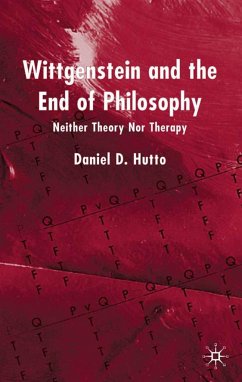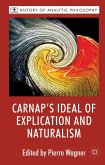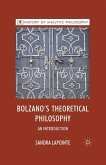What is the true worth of Wittgenstein's contribution to philosophy? Opinions are strongly divided, with many resting on misreadings of his purpose. This book challenges 'theoretical' and 'therapeutic' interpretations, proposing that Wittgenstein saw clarification as the true end of philosophy, that his approach exemplifies critical philosophy.
Hinweis: Dieser Artikel kann nur an eine deutsche Lieferadresse ausgeliefert werden.
Hinweis: Dieser Artikel kann nur an eine deutsche Lieferadresse ausgeliefert werden.
'...one of the more important contributions to Wittgenstein studies in recent years...serves as a helpful corrective to various current readings of his work.' -John Koethe, Mind
'Hutto effects a much-needed repositioning of theory and therapy. His sensitive and fluent reading allows him to pick out the real implications of Wittgenstein's philosophy from its misleading look-alikes.' - Daniele Moyal-Sharrock, University of East Anglia, UK
'Professor Hutto's new book on Wittgenstein is a rare combination of philosophical sweep and scholarly detail. In cogently developing his argument, Hutto places Wittgenstein in a larger historical context that sheds light on the unique significance of this way of looking at the end of philosophy.' - Barry Curtis, Professor of Philosophy, University of Hawaii at Hilo
'Those who have decided that nothing new can be said about the degree of continuity between Wittgenstein's earliest and his latest writings should read this book. It will change their minds. Daniel Hutto has developed an original and compelling interpretation that defends the continuity thesis. This study is remarkable for its mastery of the existing literature and its acuity in making sharp distinctions. I recommend it strongly.' - Avrum Stroll, University of California, USA
'Professor Hutto tackles a problem that is central not just to the understanding of Wittgenstein but also to the self-understanding of our subject...He brings the issue to life through his extensive knowledge not just of Wittgenstein's work, but also of other reference-points ranging from transcendental idealism and Hegel's conception of logic to contemporary debates about the limits of conceptual anaylsis.' - Hans-Johann Glock, University of Reading, UK
'...Hutto's clear and straightforward style make it remarkably accessible, even to non-specialists.' - Kevin A. Aho, The European Legacy
'Hutto effects a much-needed repositioning of theory and therapy. His sensitive and fluent reading allows him to pick out the real implications of Wittgenstein's philosophy from its misleading look-alikes.' - Daniele Moyal-Sharrock, University of East Anglia, UK
'Professor Hutto's new book on Wittgenstein is a rare combination of philosophical sweep and scholarly detail. In cogently developing his argument, Hutto places Wittgenstein in a larger historical context that sheds light on the unique significance of this way of looking at the end of philosophy.' - Barry Curtis, Professor of Philosophy, University of Hawaii at Hilo
'Those who have decided that nothing new can be said about the degree of continuity between Wittgenstein's earliest and his latest writings should read this book. It will change their minds. Daniel Hutto has developed an original and compelling interpretation that defends the continuity thesis. This study is remarkable for its mastery of the existing literature and its acuity in making sharp distinctions. I recommend it strongly.' - Avrum Stroll, University of California, USA
'Professor Hutto tackles a problem that is central not just to the understanding of Wittgenstein but also to the self-understanding of our subject...He brings the issue to life through his extensive knowledge not just of Wittgenstein's work, but also of other reference-points ranging from transcendental idealism and Hegel's conception of logic to contemporary debates about the limits of conceptual anaylsis.' - Hans-Johann Glock, University of Reading, UK
'...Hutto's clear and straightforward style make it remarkably accessible, even to non-specialists.' - Kevin A. Aho, The European Legacy








